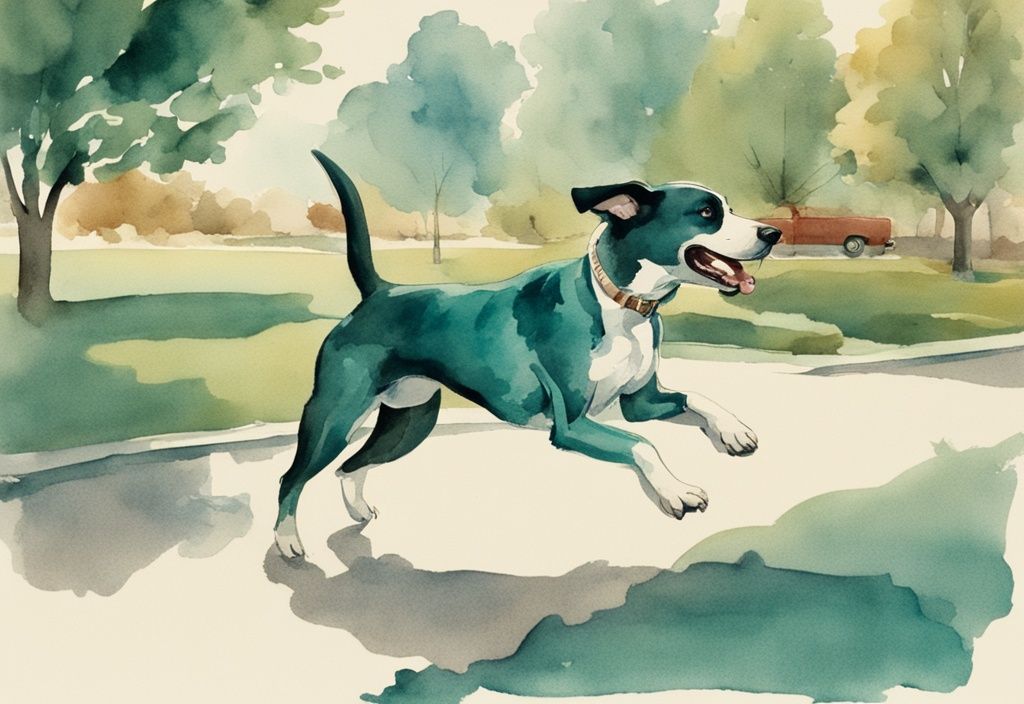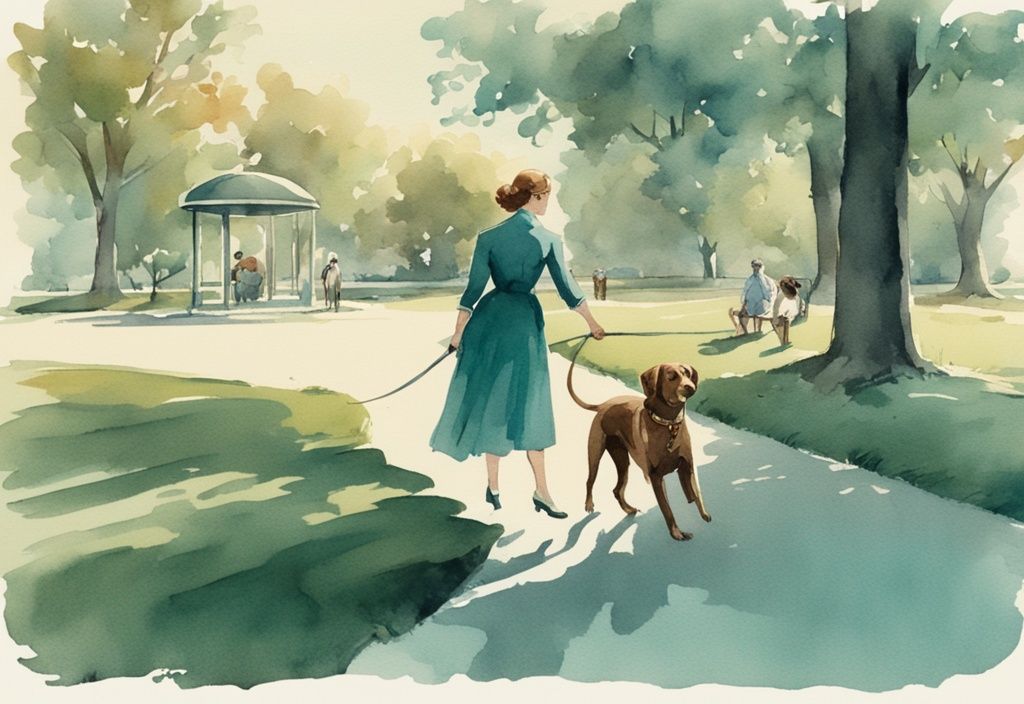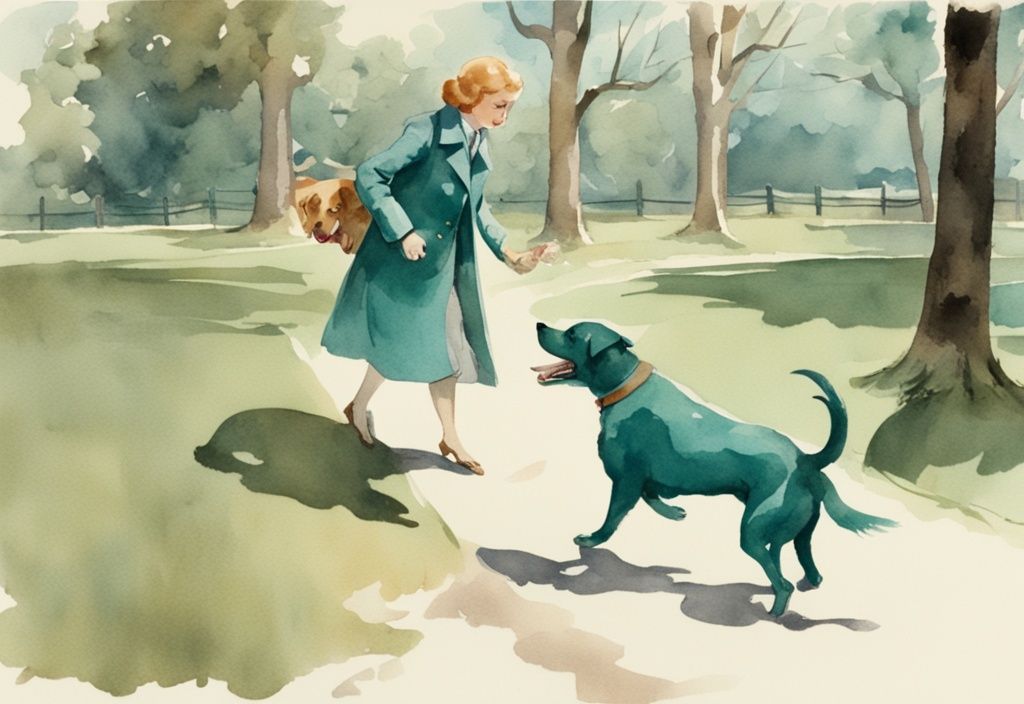Ever wondered, “What happens when my dog bites another dog?” Well, you’re not alone. This all-too-real worry can send shivers down any dog owner’s spine, and it’s an important issue we need to discuss.
Now, imagine a world where you’ve grasped all the need-to-knows of this situation, absolving fears of the unknown. Sounds comforting, doesn’t it? That’s exactly what we’re going to delve into in this article – the immediate steps to take, potential legal issues, financial liabilities, and how to prevent future incidents to prioritize safety.
Equipped with this vital knowledge, you’ll be prepared to take charge like a pro dog owner. It’s all about turning terrifying What-Ifs into a confident “I’ve Got This!” Let’s navigate this journey together.
Immediate Steps to Follow When Your Dog Bites Another Dog
Staying Calm to Ensure Safety
Remaining calm in the immediate aftermath of a dog bite incident is crucial. Panicking will only exacerbate the tension between the dogs and may prevent a safe resolution. Avoid stepping between the dogs as this can put you at risk of being bitten. Instead, try to disrupt your dog’s focus from a safe distance. Using a loud noise, tossing a favorite toy, or even throwing a light coat can help divert your dog’s attention and break up the confrontation.
Separating the Dogs: Here’s How
When it comes to physically separating the dogs, safety remains the priority. Utilize a long object, like a broom or a stick, to keep your distance while gently nudging the dogs apart. Another effective method is to splash cold water onto them, which can shock and separate them without physical contact. Once the dogs are apart, quickly leash your dog to prevent any further interaction. Move your dog to a quiet and secluded spot where they can calm down away from the excitement and stress of the incident.
Checking Injuries and When to Seek Veterinary Care
After ensuring the dogs are separated and calm, check your dog for any injuries. Look for bite marks, puncture wounds, and any signs of distress or pain. It’s vital to seek veterinary care immediately if your dog shows any symptoms of severe injury, including lethargy, swelling, difficulty breathing, or bleeding. Additionally, if the other dog is hurt, offer assistance to its owner by helping to get their dog to a veterinarian if it’s safe to do so.
Exchanging Necessary Information with the Other Dog’s Owner
Following the incident, it’s essential to exchange critical information with the other dog’s owner. Share your names, addresses, and contact details to ensure open communication. Comparing each dog’s vaccination records can be important for addressing potential health concerns. Document the situation thoroughly, taking clear photos and videos if possible, to have accurate records of the event. This documentation can be vital for insurance claims and any potential legal actions stemming from the incident.
Legal and Financial Implications of Your Dog Biting Another Dog
When your furry friend gets into trouble, understanding the aftermath is crucial. Here’s a compassionate dive into what happens if your dog bites another dog, touching on legal and financial aspects.
Understanding Owner’s Liability and Potential for Lawsuits
When pondering what happens if my dog bites another dog, it’s key to realize that you could be held liable for the injuries and damages caused. This often includes various costs like veterinary care, surgical expenses, and the recovery of the hurt dog. Moreover, the dog owner of the injured pup might take legal action, seeking compensation for vet bills and emotional distress. Though claims for emotional distress are valid, pain and suffering are generally not part of these lawsuits.
Role of Local Animal Control in Dog Biting Incidents
Local animal control can be vital in such incidents. Once the bite is reported, they usually carry out an investigation to gather a better understanding. If necessary, the biting dog might be quarantined to ensure community safety. This helps assess the dog’s behavior and health status before moving forward with further actions.
Identifying Key Factors in Proving Negligence
In the chaos following a bite, negligence becomes a focal point. To prove negligence, you must show that the other dog owner didn’t fulfill their duty of care, leading to the injury. Solid evidence is your ally here. Think photos, videos, expert testimonies, and witness statements from those who were around during the incident. Such evidence can be your defense armor if a lawsuit is filed.

Navigating Insurance Policies and Coverage
When faced with the dilemma of what happens if my dog bites another dog, checking your insurance policies becomes essential. Homeowners or renters insurance often offers liability coverage, which might cover claims from bite incidents. Policies differ; some may exclude certain breeds or require extra premiums. Reviewing your policy specifics helps you understand what’s covered and prepare for any financial responsibilities.
By knowing these steps and grasping the legal and financial ramifications, dog owners can handle the situation better if their dog bites another dog. With compassion and careful management, you can navigate these choppy waters effectively.
The Consequences Your Dog May Face
How Your Dog Could Be Declared Dangerous
When thinking about what happens if my dog bites another dog, it’s crucial to grasp the seriousness of the situation. If your dog bites another dog, it might be seized and placed on “bite hold” at a local shelter. This is a precautionary measure to ensure public safety and to prevent further incidents.
Typically, as the owner, you’ll be entitled to a hearing before any official declaration of your dog being dangerous is made. This hearing allows you to present your case and any evidence that might mitigate the situation. Understanding your rights and preparing for this hearing are crucial steps in ensuring a fair outcome.
What Being a ‘Dangerous Dog’ Really Means
If your dog is officially declared dangerous, the consequences can be significant. You might need to take extensive precautionary measures. These measures could include muzzling your dog whenever it’s in public, posting a “vicious dog” sign on your property, or even relocating your dog to another community.
In extreme cases, euthanasia might be considered as a last resort. Given the gravity of these potential outcomes, it’s vital to consult with a lawyer who can help you navigate the legal challenges and understand fully what happens if my dog bites another dog. A lawyer can assist in contesting the dangerous dog declaration and exploring all possible defenses and mitigation strategies.
Understanding the Emotional Impact on The Dogs Involved
It’s important to delve into the emotional repercussions felt by both dogs when considering what happens if my dog bites another dog. This helps us address the needs of both canines in the aftermath.
Recognizing the Potential Effects on the Injured Dog
When your dog bites another dog, the emotional trauma suffered by the injured dog is heartbreaking. Besides the physical pain, the poor pup might grapple with heightened anxiety, fear, and avoidance behaviors. Imagine how frightening this ordeal must be for them. You might notice excessive barking, shaking, or even hiding. Seeking help from a behavioral therapist could be vital here. Specialists can desensitize the traumatized dog to triggers, gradually restoring their confidence and sense of security. It’s all about helping them feel safe and loved once again.
Understanding the Impact on Your Dog
But let’s not forget about your own dog in this scenario. Believe it or not, they could be feeling a mix of confusion and shame after the bite. If these feelings aren’t properly addressed, it could lead to reinforced negative behaviors. Sometimes, this confusion morphs into increased aggression or a stronger predatory instinct. Speaking with a vet or a qualified behavioral specialist is key. They can pinpoint why your dog acted out—be it fear, territorial impulses, or another reason—and create a tailored management plan. Getting support early on can make a world of difference, helping to prevent future incidents and promoting your dog’s emotional health.
So, in summary, understanding what happens emotionally to both the injured dog and your own dog is crucial. Taking the right steps ensures you’re creating a safe and supportive environment for everyone involved. Together, you can navigate this tough time and help both dogs heal, physically and emotionally.

How to Prevent Your Dog from Biting in Future
Ensuring your dog doesn’t exhibit aggressive reactions like biting others is crucial for a happy and peaceful life together. Below, you’ll find practical advice on socialization, training, and recognizing early signs of aggression, all designed to help you manage and nurture your dog’s behavior.
Role of Proper Socialization and Training
Proper socialization from an early age plays a crucial role in preventing aggressive behavior in dogs. Introducing your pup to a variety of environments, people, and other animals helps them become well-adjusted and less likely to react aggressively. Socialization should be a gradual process, ensuring that your dog has positive experiences during these encounters.
Training is equally essential in shaping your dog’s behavior, and utilizing positive reinforcement techniques can significantly enhance your dog’s learning experience. For more information on effective training methods, check out this resource on positive reinforcement dog training. Positive, reward-based training methods can encourage good behavior and strengthen the bond between you and your dog. Use treats, praise, and play as incentives for your dog to follow commands and behave appropriately. Consistency and patience are key; regular training sessions will reinforce desired behaviors and reduce the likelihood of future incidents where you might wonder, what happens if my dog bites another dog.
Implementing Muzzles and Leashes: A Guide
If your dog has shown signs of aggression towards other dogs, muzzle training can be a valuable tool. Muzzles can prevent bites during unexpected aggressive episodes. Start by gradually introducing the muzzle, allowing your dog to sniff and wear it for short periods, gradually increasing the duration to ensure they are comfortable.
Leashes are another critical tool for managing your dog’s behavior, especially in unfamiliar settings. Always keep your dog on a leash when around unknown dogs and people. Opt for a sturdy leash and consider using a harness if your dog tends to pull. This control prevents situations where you might need to deal with the repercussions of what happens if my dog bites another dog.
Detecting Signs of Anxiety and Aggression Early
Being able to recognize early signs of anxiety and aggression in your dog is essential for preventing bites. Common indicators include growling, baring teeth, rigid posture, and intense staring. Subtle signs like lip licking, yawning, and avoiding eye contact can also hint at discomfort and stress.
Address these signs promptly to prevent escalation. Remove your dog from stressful situations and provide a calm environment to help them relax. Training and socialization are also important in managing these behaviors. Consulting a behavioral specialist can provide personalized strategies and support, reducing the likelihood of aggressive outbursts and the ensuing concerns about what happens if my dog bites another dog.
In a Nutshell: Dog Biting Another Dog
Remain Calm, Separate the Dogs Safely, and Check for Injuries
When faced with the stressful scenario of your dog biting another dog, it’s crucial to keep your composure. Remaining calm is essential to prevent the situation from worsening. Avoid getting between the dogs to ensure your safety.
Instead, distract your dog from a distance using a loud noise, a favored toy, or by throwing an item like a coat. Once the dogs are apart, inspect your pet for injuries, paying attention to any bite or puncture wounds. If injuries are present or if your dog exhibits signs of distress, such as lethargy or swelling, seeking immediate veterinary care is imperative.

Exchange Necessary Information with the Other Dog’s Owner
In the aftermath of an incident where your dog bites another dog, it’s important to communicate effectively with the other dog’s owner. Exchange names, addresses, and contact information. This not only fosters transparency but is also essential for potential insurance and legal purposes.
Both parties should share vaccination records to ensure the wounded dogs are up to date with necessary shots. To document the incident accurately, take photos and videos if possible.
Understand the Potential Legal and Financial Liabilities
Understanding what happens if my dog bites another dog includes knowing the legal and financial responsibilities involved. Dog owners can be held legally liable for injuries inflicted by their pets, which might result in substantial costs, including veterinary and surgical expenses.
There is also the potential of facing civil lawsuits for these bills and emotional distress experienced by the injured dog’s owner. Additionally, local animal control might get involved, conducting investigations and possibly imposing a quarantine on your dog.
Prevent Future Incidents Through Proper Training, Socialization, and Early Intervention of Aggression Signs
Preventing future episodes of aggression hinges on proper training and socialization. Ensuring your dog is well-socialized from a young age can significantly reduce the risk of aggressive behavior.
Utilizing modern, positive reward-based training methods will help encourage good behavior in your dog. It’s equally important to detect early signs of anxiety and aggression, such as growling or a rigid posture. Addressing these signs early on, preferably with the guidance of a behavioral specialist, can help manage and correct undesirable behavior, preventing incidents from occurring in the future.
FAQs About Dog Biting Incidents
What Should I Do Right After My Dog Bites Another Dog?
First things first, separate the dogs without risking your own safety. Check both pups for any injuries – a trip to the vet might be in order. Don’t forget to exchange contact and vaccination info with the other dog’s owner – transparency is key. And if you’ve got insurance that covers liability, report the incident without delay. It’s all about being responsible and proactive.
Can I Face a Lawsuit if My Dog Bites Another Dog?
Unfortunately, yes. If your dog bites another dog, the owner of the injured dog might decide to file a lawsuit seeking compensation for veterinary care and any emotional distress. This is why it’s so important to have all the facts straight and be prepared for any legal repercussions.
How Can I Establish the Other Dog Owner Was Negligent?
Proving negligence isn’t a walk in the park. You’ll need to show that the other dog owner didn’t act with reasonable care. Collect evidence, like photos, videos, and witness statements. These can be crucial in making your case and demonstrating that the incident wasn’t entirely your dog’s fault.
What Legal Consequences Can My Dog Face?
The consequences for your dog could be serious. Your furry friend might be labeled as dangerous, which can mean anything from needing to wear a muzzle in public, putting up warning signs, to having to move or, in the worst-case scenario, facing euthanasia. Talking to a lawyer can help you navigate and understand these potential outcomes.
How Can I Prevent My Dog from Biting Again?
Preventing future bites involves good socialization and thorough training. Think about using muzzles and leashes in new environments to keep everyone safe. And if your dog shows early signs of anxiety or aggression, a behavioral specialist can offer tailored advice to manage and reduce these behaviors. It’s all about creating a happy, healthy environment for your dog.
